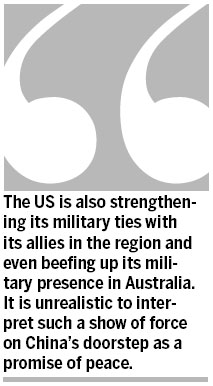Nourishing friendship
Updated: 2012-05-05 11:03
By Wang Hui (China Daily)
|
||||||||
China and the US should take long-term view and endeavor to build greater mutual trust and expand common ground
With the eyes of the world on them, China and the United States held the fourth round of the Strategic and Economic Dialogue in Beijing on Thursday and Friday. There have been positive messages from both sides indicating their joint commitment to better managing their relations to the benefit of themselves and the rest of the world.
|
 |
"Whatever changes may take place in the world, and no matter how the domestic situations in our two countries may evolve, China and the United States should be firmly committed to advancing their cooperative partnership and build a new type of relationship between major countries that is reassuring to the peoples of China and the United States and people across the world," said President Hu Jintao addressing the opening session on Thursday morning.
Hu's remarks underline the importance of Sino-US ties on the world stage. No one can deny interactions between Beijing and Washington now have implications far beyond their bilateral scope, as any move taken by the world's two largest economies will have an impact on the world economy and any efforts to address issues of global concern are unlikely to bear fruit if the world's largest developed and developing countries refuse to cooperate.
It is in this context that Hu put forward the proposal on Thursday that China and the US should break with tradition and avoid the conflict that has historically arisen between big powers and instead explore ways to develop friendly relations. Hu's remarks are particularly relevant as many US politicians and scholars insist on viewing China-US ties as a zero-sum game. If such thinking prevails there is no guarantee that the two big powers will not be pushed into a major conflict some day.
As such, the sagacity of Hu's proposal is self-evident, as it takes a long-term view and accommodates the basic interests of both countries. It should guide decision-makers on both sides when they chart the future course for bilateral ties or seek concrete solutions to disagreements between them.
At the heart of the proposal is the need to build political and strategic mutual trust.
It is a worrying fact that mutual distrust remains, despite the commitment and dedicated efforts of both leaderships and the bond between our two economies and our two peoples growing increasingly strong. In March, Wang Jisi, director of the Center for International and Strategic Studies, and Kenneth Lieberthal, director of the John L. Thornton China Center of the Brookings Institute, pointed out the underlying concerns each leadership harbors about the other in their paper "Addressing US-China Mutual Distrust".
Chinese leaders have reiterated their resolve to deepen mutual understanding and build mutual trust with their American counterparts. The official visit by Defense Minister Liang Guanglie to the US on Friday, signifies Beijing's continuing efforts to build strategic mutual trust with Washington. It marks the first high-level exchange between the two militaries since relations were soured by the US plan to sell arms to Taiwan last year.
Past experience indicates that each time the White House gives the green light to arms sales to the Chinese island province, bilateral cooperation suffers a heavy blow. And although the US has said it will not take sides in the South China Sea issue, its military exercises, one after another, with the countries involved in maritime territorial disputes with China, are interfering in regional attempts to find peaceful solutions. The US is also strengthening its military ties with its allies in the region and even beefing up its military presence in Australia. It is unrealistic to interpret such a show of force on China's doorstep as a promise of peace.
The US leadership should seize the opportunities available to help China better understand its intentions both regionally and globally in order to avoid misjudgments. Political wisdom from both sides is needed to control the risks arising from any disputes. To deepen mutual trust both politically and strategically, the two nations need to face their differences squarely and comprehensively discuss them.
The author is a senior writer with China Daily. E-mail: wanghui@chinadaily.com.cn

 Relief reaches isolated village
Relief reaches isolated village
 Rainfall poses new threats to quake-hit region
Rainfall poses new threats to quake-hit region
 Funerals begin for Boston bombing victims
Funerals begin for Boston bombing victims
 Quake takeaway from China's Air Force
Quake takeaway from China's Air Force
 Obama celebrates young inventors at science fair
Obama celebrates young inventors at science fair
 Earth Day marked around the world
Earth Day marked around the world
 Volunteer team helping students find sense of normalcy
Volunteer team helping students find sense of normalcy
 Ethnic groups quick to join rescue efforts
Ethnic groups quick to join rescue efforts
Most Viewed
Editor's Picks

|

|

|

|

|

|
Today's Top News
Health new priority for quake zone
Xi meets US top military officer
Japan's boats driven out of Diaoyu
China mulls online shopping legislation
Bird flu death toll rises to 22
Putin appoints new ambassador to China
Japanese ships blocked from Diaoyu Islands
Inspired by Guan, more Chinese pick up golf
US Weekly

|

|






